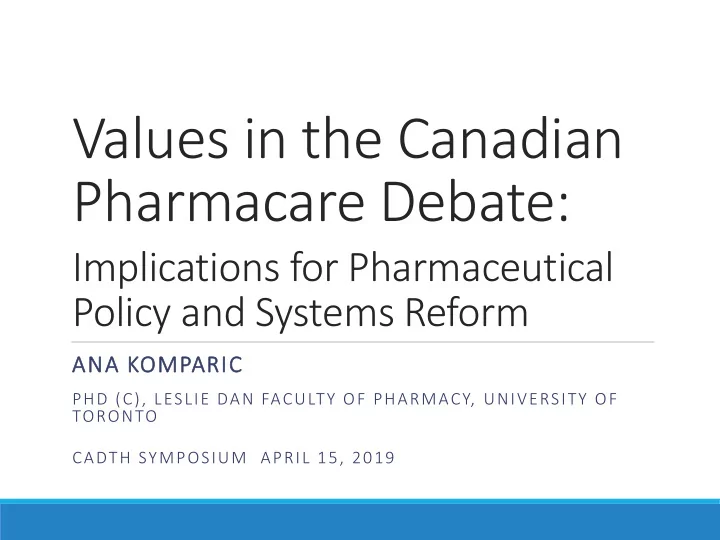

Values in the Canadian Pharmacare Debate: Implications for Pharmaceutical Policy and Systems Reform ANA KOMPARIC PHD (C), LESLIE DAN FACULTY OF PHARMACY, UNIVERSITY OF TORONTO CADTH SYMPOSIUM APRIL 15, 2019
Disclosure I have the following relationship to disclose: • consulting research assistant for CADTH ethics reviews
Acknowledgements Supervisor: Professor Alison Thompson Advisory Committee: Professors Zubin Austin, Joseph Heath and Ross Upshur This research was supported by:
The Pharmacare Debate 1972 2002 Kirby and Romanow Commissions 1940s The Drug Price 2003 Health Accord Program 2004 National Pharmaceutical Strategy 2018 – 2019 HESA Report Federal Budgets & Advisory Council 2010s 1997 National Forum on Health
Values and Public Policy Health policy decisions are complex and value-laden. 1 • Which benefits (policy goals) should be maximized? • How should the benefits and burdens of a policy be distributed? • What makes public policy decisions legitimate? Pharmacare policy is no exception: • Lack of principled ideas on the part of politicians and absence of clear electoral motivations about pharmacare has hindered reform. 2 …we might benefit most from a consideration of the basics - -where we want to get to and why. […]Whether they are improved access, more equal coverage or greater system efficiency, what are the principles that should guide us in considering national approaches to pharmacare? – Minister Allan Rock 3 1. Fischer, F., & Forseter, J. (1987). Confronting values in policy analysis: The politics of criteria . Newbury Park, CA: Sage Publications, Inc.; Kenny, N. and M. Giacomini. 2005. “Wanted: A New Ethics Field for Health Policy Analysis.” Health Care Analysis 13(4):247-260. 2. Boothe, K. 2015. Ideas and the Pace of Change: National Pharmaceutical Insurance in Australia, Canada, and the United Kingdom. Toronto, ON: University of Toronto Press. 3. Canada. 1998. Conference on National Approaches to Pharmacare: proceedings, Saskatoon, Saskatchewan. Ottawa: Health Canada
The Study • Aim: to identify how normative concepts (i.e., principles, values, ethical concepts, etc.) are used to justify different pharmacare policy arguments and proposals • Qualitative, thematic analysis 4 of a purposive sample of 60 policy documents and media opinion pieces from 1997 - 2019 4. Braun, V., & Clarke, V. (2006). “Using thematic analysis in psychology.” Qualitative Research in Psychology, 3 (2): 77-101.
Findings Growing consensus (at least tacit) that universalizing drug coverage to improve access based on equity and efficiency • “Access based on need, not the ability to pay” Growing consensus amongst payers about the need to lower drug costs based on efficiency 5 But, how should national pharmacare be financed and administered? 5. Government of Canada, (2019). Investing in the Middle Class: Budget 2019. Ottawa: Government of Canada. .
Findings PUBLIC, SINGLE-PAYER “FILL -IN-THE- GAPS” MIXED • Access based on need, not other • Mitigates ‘leveling - down’ or criteria such as residency, reducing access for those with income, employment status, existing private coverage (timely age, etc. (equity, fairness) access, drugs not listed on public formularies) (efficiency, welfare) • Lower costs (individually, • Lower costs to public payer / collectively) (efficiency) taxpayer (efficiency) • Appropriate prescribing and use • Patient and provider choice of safe and effective medications (efficiency, welfare) (liberty)
Discussion: Implications for Policy Reform Value tensions underlie disagreements in the debate: • What is “appropriate” medication use? • Population vs. individual perspective • What is the most efficient mechanism? • Expensive drugs for rare diseases Implications for HTA in Canada: • Increased evidence-generating capacities with sufficient resources to ensure timely review • Ethical processes and mechanisms for exceptions
Questions? ana.komparic@mail.utoronto.ca
Recommend
More recommend